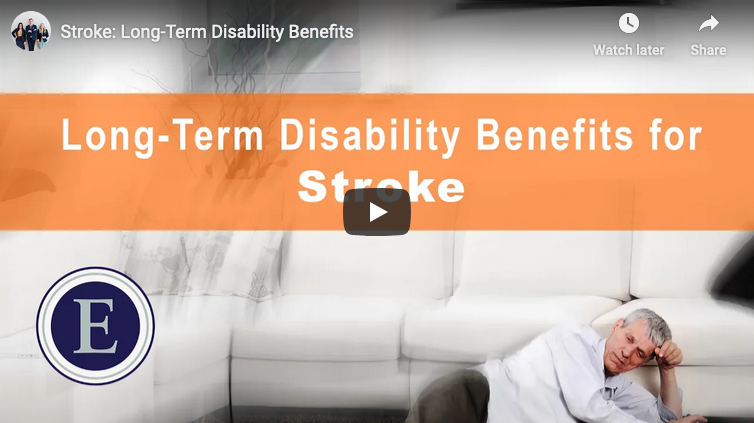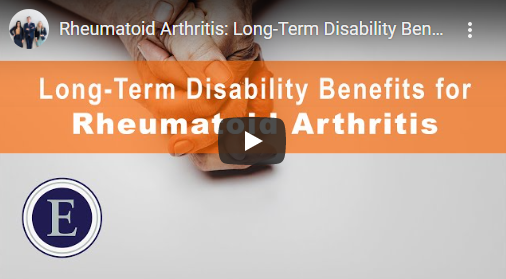Do I Qualify for Long-Term Disability Benefits if I Have Generalized Anxiety Disorder?
Can I Get Long-Term Disability Benefits for Generalized Anxiety Disorder?
One of the most common questions we get is “Do I qualify for long-term disability benefits if I have Generalized Anxiety Disorder?”
Generalized Anxiety Disorder (GAD) is recognized as excessive worrying that disrupts one’s relationships, health, and overall productivity. It can drastically affect employment and your daily life.
Therefore, GAD can qualify for long-term disability benefits – provided it is not excluded by your insurance policy wording.
LTD Denied? Which Category Do You Fit In?
Category 1: The insurance company denied your initial claim for disability benefits for Generalized Anxiety Disorder.
Category 2: The insurance company denied your appeal.
Category 3: The insurance company discontinued or terminated your benefits.
What Can We Do For You?
We’ll work with you and your physician to help challenge the insurance company’s denial or discontinuance of your long-term disability benefits.
Where necessary, we will engage other trusted professionals to support your case including specialists, functional capacity evaluators, and vocational evaluators to help credibly explain why your disability symptoms are preventing you from doing your “own occupation” or “any occupation”.
Our Help Can Make All The Difference. How?
- Over 25 years’ combined experience getting our clients the benefits they deserve.
- Expertise in both disability and employment law (your employment status is directly linked with your disability)
- We offer a free case assessment
- We offer flexible rates, including contingency fees (i.e., only pay if you win)
- Service across all of Ontario


Generalized Anxiety Disorder: Overview
Generalized anxiety disorder (GAD) is persistent stress and worry experienced for a period of at least six months. GAD can develop in childhood or adulthood and can be caused by a variety of factors such as negative experiences, genetics or a timid/reserved temperament.
Generalized anxiety disorder often co-exists with other mental illnesses.
These include but are not limited to:
- Panic Disorder
- Obsessive Compulsive Disorder
- Depression
- Social Anxiety Disorder
- Substance Abuse
Despite GAD being treatable, symptoms attributed to generalized anxiety disorder often continue to present themselves throughout one’s life.
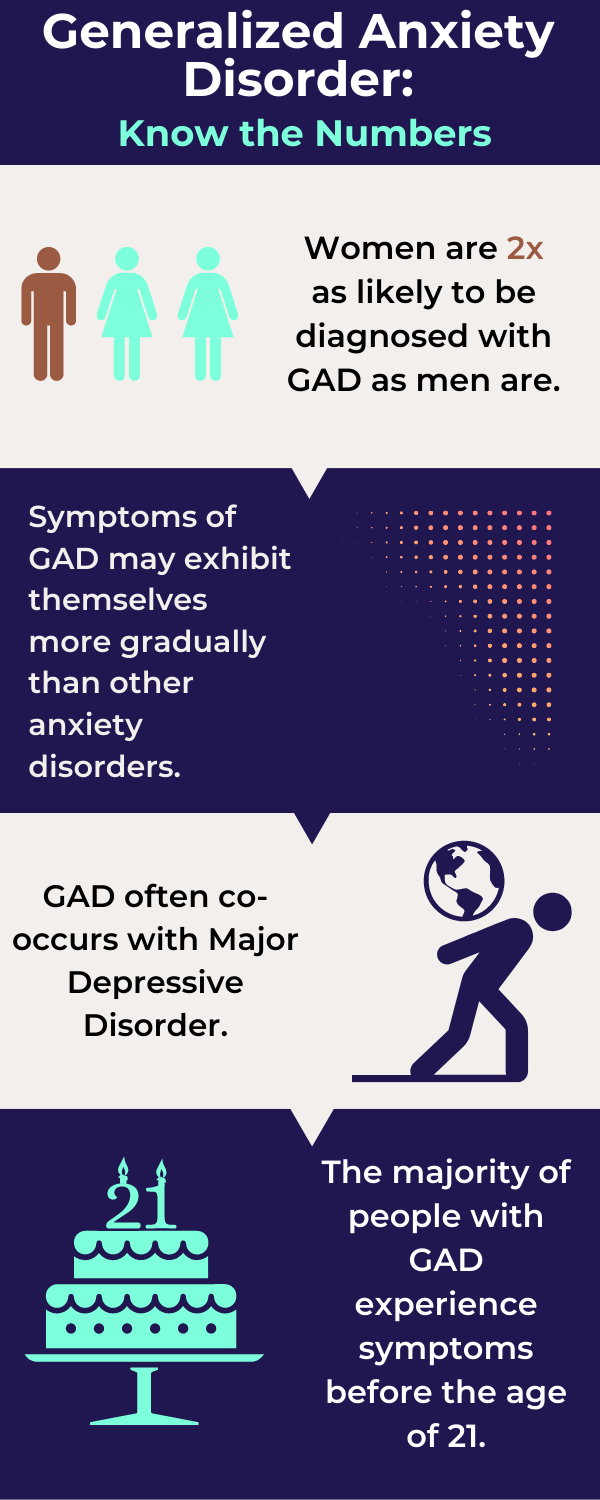
Most Common Symptoms of Generalized Anxiety Disorder
Symptoms of generalized anxiety disorder include:
- Persistent worry (often to a degree that is disproportionate to the possible outcome of the event)
- Perceiving situations/people as threatening with no supporting evidence
- Restlessness
- Indecisiveness
- Difficulty sleeping
- Muscle tension/aches
Criteria for a Diagnosis of Generalized Anxiety Disorder
Generalized anxiety disorder is diagnosed with a full physical exam to detect any underlying health conditions or medications that your symptoms may be linked to. Your physician should ask you extensive questions about your symptoms and medical history and you will likely partake in psychological questionnaires.
GAD can be difficult to diagnose as it usually co-exits with additional mental health conditions such as depression or obsessive-compulsive disorder (OCD).
For this reason, long-term disability insurers often deny claims for generalized anxiety disorder.
Treatment for Generalized Anxiety Disorder
Medication
GAD is often treated with medication. Anti-depressants (e.g. escitalopram, duloxetine) are one of the most commonly prescribed treatments for generalized anxiety disorder, with the intent of increasing levels of serotonin and/or norepinephrine in the brain. Buspirone or benzodiazepines may also be prescribed, however, it is careful to note that benzodiazepines are only used for short-term treatment of extreme cases and are not to be prescribed to those who have a history of alcohol or drug abuse.
Psychotherapy
Psychotherapy is often suggested in combination with medication. Cognitive behavioural therapy is proven to be the most effective in treating symptoms of generalized anxiety disorder. With a therapist, you will learn skills to manage your symptoms and gradually return to the activities your anxiety was preventing you from participating in.

Generalized Anxiety Disorder & Your Employment
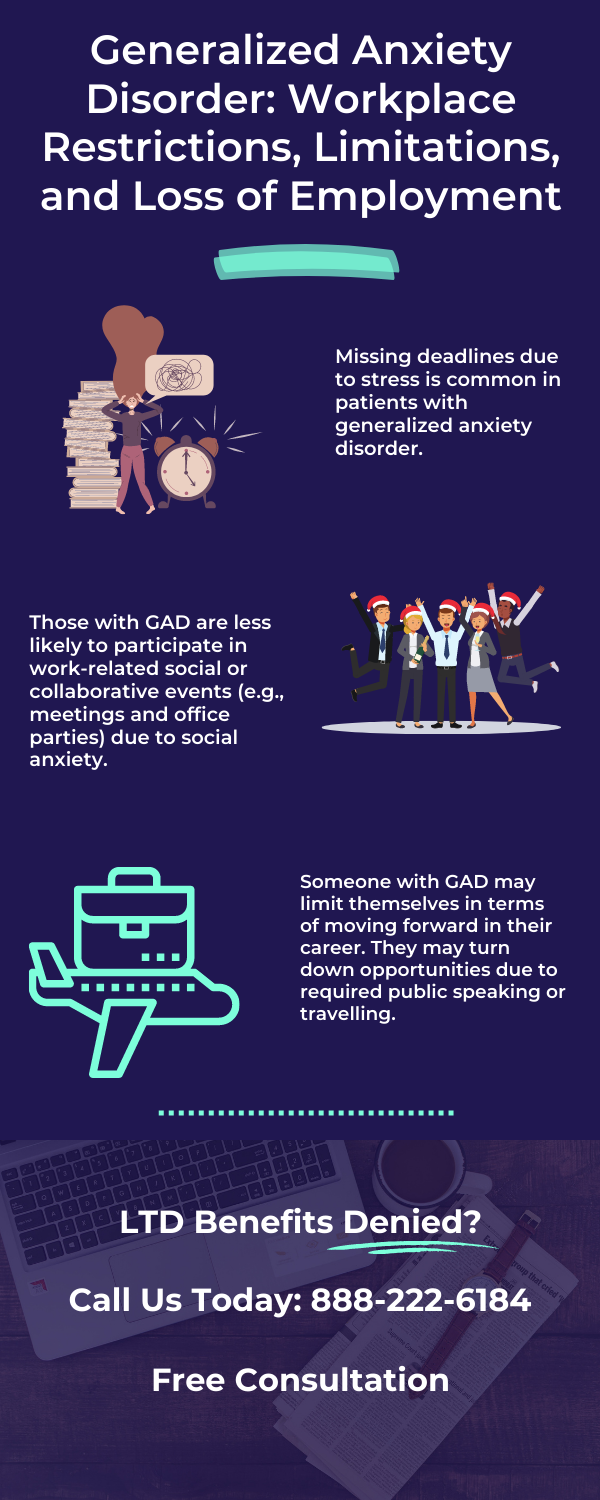
Workplace Restrictions Caused by Generalized Anxiety Disorder
When considering your employment and GAD diagnosis, consider how stable your condition is, how safe you are to do your job and what the demands are physically and mentally.
Consider the following:
- Anxiety Disorders are most prevalent in the fields of education, medicine and social work.
- The rate of diagnosed generalized anxiety disorders significantly increased post-pandemic.
Generalized Anxiety Disorder and Workplace Discrimination
It is unlawful to discriminate against someone in the area of employment based on their physical disability: Ontario’s Human Rights Code and the Canadian Human Rights Act.
If you are suffering from GAD, you might face discrimination in a variety of ways:
- You experience employment termination because you have GAD.
- You are denied accommodation because of your Parkinson’s GAD.
- After returning from a disability leave, your employer places you in a lower, part-time position at a lower rate of pay.
- Someone makes unwelcome remarks or jokes about your disability.
- Someone offends or humiliates you physically or verbally threatens or intimidates you because of your disability.
- Retaliating against you for filing a human rights complaint.
Ertl Lawyers are experts in Employment and Disability Law. If you have been discriminated against, our disability and employment lawyers in Toronto can help, including:
- Having your employer comply with their duty to accommodate you.
- Having your employer stop all forms of discriminatory conduct.
- Representing you in wrongful dismissal in Ontario, constructive dismissal, and human rights matters.
- Ensuring that your employer complies with its statutory obligations, including its obligations under the Employment Standards Act.
- Negotiation severance packages (including continuation of benefits).

Generalized Anxiety Disorder & Insurance Companies
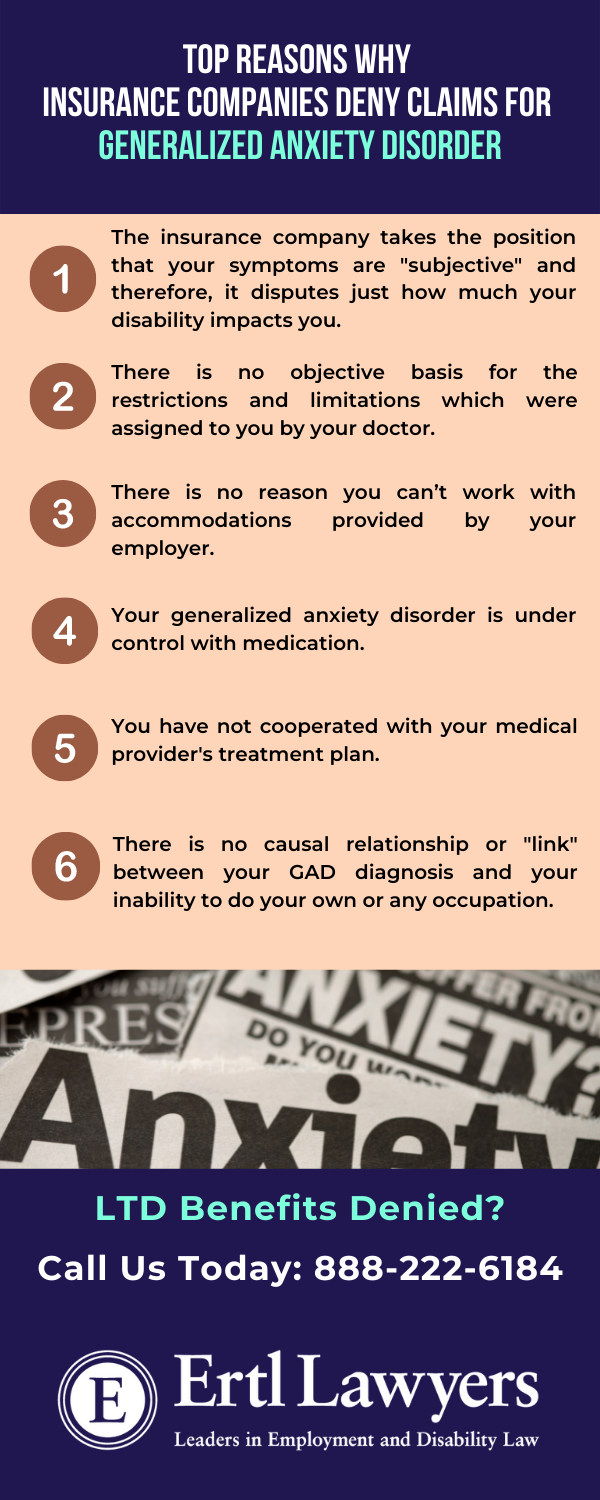
Apply for Long-Term Disability Benefits for Generalized Anxiety Disorder?
Review Your Policy Carefully
Your entitlement to long-term disability benefits for generalized anxiety disorder depends on the specific wording of your disability policy.
Therefore, you will need to review your policy and see how it defines things like “totally disabled” and “occupation” – and whether any exclusions apply (particularly for pre-existing conditions).
Gather Medical Evidence
To be entitled to long-term disability benefits for GAD every insurer requires you to provide medical evidence documenting how your illness or injury causes restrictions or lack of ability, such that you are prevented from performing the essential duties of your occupation.
Therefore, you will need a copy of your medical records to see if there is an objective basis for your diagnosis of generalized anxiety disorder and what your medical records say about your symptoms and your restrictions and limitations.
Gather Evidence of Workplace Limitations
Because your entitlement to long-term disability benefits for GAD depends on the strength of your evidence, you should get a copy of your employee file from work. It may show your GAD negatively impacted your work performance. Your work performance may have been affected by frequent absences from work, stress, etc.
Create a List of the Physical Duties of Your Job
You should get a copy of your job description. Based on that job description, you should write out a detailed list of the physical (and mental) duties associated with your job description – and explain how your generalized anxiety disorder limits or prevents you from performing your own occupation.
Ask Your doctor for a Report
It is recommended that you provide your doctor with your occupational description. You should ask your doctor to prepare a report that clearly explains the objective basis for:
- Your diagnosis of generalized anxiety disorder
- Your restrictions and limitations
- Reasons why you are unable to perform some or all of the essential duties of your own occupation.
Follow Your Doctor’s treatment Plan
Your entitlement to long-term disability benefits also requires you to be receiving regular, ongoing care and treatment for your GAD. In other words, don’t skip appointments, and always follow your doctor’s treatment plans.
Keep a Diary
On your end, it is important to keep a diary tracking your symptoms, and whether your treatment is helping.
What Other Benefits Might I Be Entitled to for Generalized Anxiety Disorder?
Other than short-term and long-term disability benefits through a group or individual insurance plan, people suffering from GAD might be entitled to one or more of the following benefits:
- Employment Insurance (EI) Sickness Benefits;
- Ontario Disability Support Plan (ODSP);
- Disability Tax Credit (DTC);
- Disability Creditor Insurance (under your mortgage or credit cards);
- Trillium (extended health benefits);
- Canada Pension Plan Disability (CPP-D); and
- Disability Pension (employer).
Organizations / Associations / Colleges
- Anxiety Canada
- Anxiety Disorders Association of Ontario
- Anxiety and Depression Association of America (ADAA)
- National Alliance on Mental Health (NAMI)
Disclaimer: The content on this web site is provided for general information purposes only and does not constitute legal, medical, or other professional advice or an opinion of any kind. Users of this web site are advised to seek specific legal advice by contacting members of Ertl Lawyers (or their own legal counsel) regarding any specific legal issues. Ertl Lawyers does not warrant or guarantee the quality, accuracy or completeness of any information on this web site
Sources:
https://www.mentalhelp.net/anxiety/facts-about-generalized-anxiety-disorder/
Long-Term Disability Benefits Denied?
Ertl Lawyers provides expert representation in long-term disability matters.
The vast majority of disability matters are resolved through negotiation and mediation – and that’s because insurance companies know that we are passionate about our clients’ rights.
How we can help you:
• free disability policy analysis
• free case assessment
• applying for disability benefits
• appealing a denial or termination of your benefits
• disputing a denial through a legal claim
• handling all communications with your employer
• protecting your employment
• prosecuting human rights claims
Fair, Flexible Rates – Including Contingency Fees
(Don’t Pay Unless You Win)
Our Help Can Make All The Difference.
Related Blogs
Understanding the Duty to Accommodate Laws in Canada
Laws regarding duty to accommodate aim to level the playing field in situations that inherently discriminate against individuals based on factors they cannot control, and which are protected in various Canadian statutes. These protected (or prohibited) factors usually...
What Qualifies for Long-Term Disability in Canada?
Long-term disability (LTD) benefits are paid out by insurance companies according to the policy purchased by a worker, their union/association or their employer, and each has specific rules regarding how you qualify for long-term disability benefits. The general rule...
How to Apply for Long-Term Disability
One of the many things the COVID-19 pandemic made crystal clear, if it wasn't already, is that our health is often out of our control. Be it mental or physical, illnesses and injuries are mostly unexpected and can completely disrupt our lives, especially conditions...




